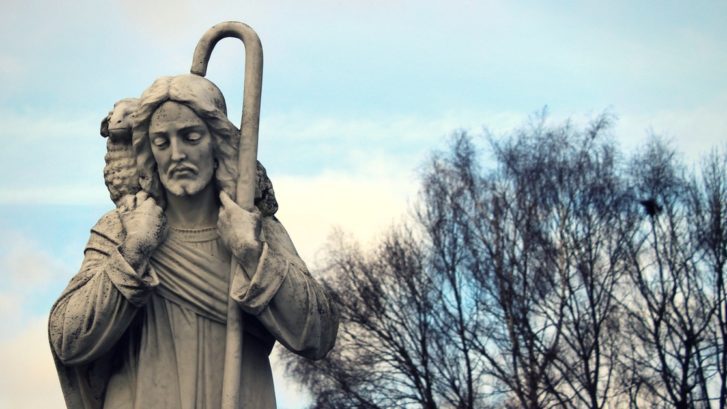The Good Shepherd
Carole King wrote some lyrics in a song that could be applied to our Gospel of the Good Shepherd: “Looking out on the morning rain, I used to feel so uninspired. And when I knew I had to face another day, Lord, it made me feel so tired. And when my soul was in the lost and found, you came along to claim it…”
Our Gospel points us to the truth that no one could care for us as deeply, eternally or passionately as God does. If we trust in ourselves alone, we will eventually find a limit to our knowledge, our strength, or our health. Our Gospel tells us that God and God alone is in whom we place our trust.
Jesus contrasts the hired shepherd from the owner shepherd. Sheep have no built-in protection, they do not have sharp claws or loud cries, they do not run fast, climb trees or fly. If sheep are to be safe, they must have a shepherd.
But, what if the shepherd is only a hired hand? What if the shepherd does not feel any loyalty or passion about the sheep or his job as shepherd? What if it is just a job to him? The sheep may be in jeopardy. Jesus points out an obvious truth: who is more likely to take care of a house, a renter or an owner? Who is more likely to watch over a business, the employee or the owner? Who is more likely to risk their life for a child, the babysitter or the parent?
Jesus is saying that He is the good shepherd and that He cares for His sheep. He knows them by name, He takes a personal interest in them. He does not see us as someone else’s business. And Jesus tells us that He is willing to lay down His life for the sheep. As He said, “Greater love has no person than to lay His life down for another.”
In the book, “The Last Temptation of Christ,” we read of the devil slithering like a serpent up the back side of the cross, out of view of everyone. The devil has come to issue Jesus one last great temptation. He whispered in Jesus’ ear as He was dying, “O come on Jesus, look at them… they are not worth all this suffering. Give them what they deserve, give them hell.” And Jesus says, “No, I would rather die than stop loving them.”
That story tells us a great truth: that Jesus would rather die than stop loving us.That there is absolutely no limit to God’s love. There is no enemy that can snatch us out of His hand, and there is no way he will stop caring for us. This shepherd does not discriminate, He is the God of the Jews, and Samaritans, and Gentiles. The God of rejects, lepers, and thieves. The God of you and me, and those we call “them;” the God who knows all of us by name.
What we see in the good shepherd is a terrible desire on God’s part to be with us, to be part of the human condition: our losses, our recessions, our disappointments, and our fractured relationships: the deaths in our families, our addictions, all those things that can turn our life upside down. The message is clear: through all of this, the good times and the bad, God wants to be with us.
A young boy at a parish school was given a month to memorize Psalm 23. He was to recite it at a school assembly, with the pastor and all the parents attending. When the big night came, he stood up and began, “The Lord is my shepherd,” and then his mind went blank. The people waited while he struggled to remember the next line. Finally, he started again, “The Lord is my Shepherd.” He paused, and then said, “And that is all I need to know.” First, there was silence, and then applause because the child was right.
The Lord is our shepherd, and that is all we need to know.


